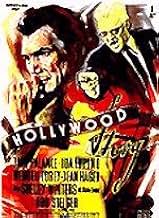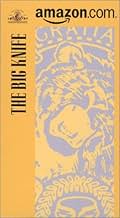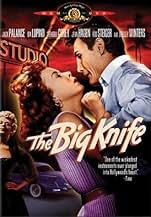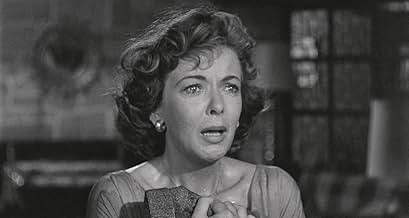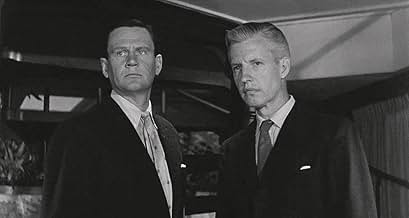IMDb-BEWERTUNG
6,8/10
4619
IHRE BEWERTUNG
Füge eine Handlung in deiner Sprache hinzuHollywood actor Charles Castle is pressured by his studio boss into a criminal cover-up to protect his valuable career.Hollywood actor Charles Castle is pressured by his studio boss into a criminal cover-up to protect his valuable career.Hollywood actor Charles Castle is pressured by his studio boss into a criminal cover-up to protect his valuable career.
- Auszeichnungen
- 1 Gewinn & 2 Nominierungen insgesamt
Michael Winkelman
- Billy Castle
- (as Mike Winkelman)
Shelley Winters
- Dixie Evans
- (as Miss Shelley Winters)
Richard Boone
- Narrator
- (Synchronisation)
- (Nicht genannt)
Nick Cravat
- Nick
- (Nicht genannt)
Robert Emhardt
- Bit Part
- (Nicht genannt)
Michael Fox
- Prize Fight Announcer
- (Nicht genannt)
Paula Kyle
- Party Guest
- (Nicht genannt)
Empfohlene Bewertungen
The Big Knife is a mostly good adaptation of a Clifford Odets play about a Hollywood actor who's being blackmailed into studio servitude while trying to patch up his failing marriage. This is a movie for which the word powerful was truly invented. Most of the film takes place on one set and places heavy emphasis on speeches from the individual characters for its really riveting moments (as I would expect from a stage play), but those moments definitely get across. The whole cast is good, but Jack Palance in a nuanced and fiery performance as the actor Charlie Castle, and Rod Steiger, giving a deeply felt and passionate realization of the corrupt studio boss are nothing short of superb. The screenplay is full of smart, incisive, biting dialogue as well. Except for a melodramatic turn at the end, that, for me, takes a lot of the edge off the story, this is a well-acted film that is solid, though not spectacular, entertainment. 3*** out of 4
A truly memorable film with tough and rugged, but hardly handsome, Jack Palance as Charlie Castle playing of all people an actor who's always playing matinée Idols and great lovers. As Charlie's boss and studio owner Stanley Hoff,Rod Steiger, says of him throughout the film :"He makes all the women of America heart's swoon". "The Big Knife" is worth the price of admission just to see how and if director Robert Aldrich can pull it off and make the film both entertaining and believable.
You see Charlie is getting tired of playing all those roles over the years as a heart throb to the women of America and wants to get out of his contract with the Hoff Studios and go independent; That was a big thing for actors back in the 1950's. Charlie wan't to do films that are worthy of his extraordinary talents as a serious and Shakespearian actor. It's that Charlie's off the wall and possessive boss Stanley Hoff, the Big Knife, doesn't want his meal ticket to leave and take his fans with him! So Stanley rolls out the heavy artillery and plays his trump card. It seems that Charlie has a dark secret that the studio has been covering up for years and if Charlie leaves that secret won't be a secret any more! Get It Charlie!
The film "The Big Knife" can really be described as one of the most multi storied soap operas ever put on film with the audience needing score cards just to keep up with the story and even then they'll get lost. Whoever coined the phrase "Seeing is believing" must have based it on the the incredible performance of Rod Steiger's Stanley Hoff which goes from a Saturday Night Live impersonation shtick of a big Hollywood producer to an Oscar winning interpretation of Hamlet all at the same time! It's really incredible to watch and believe what your seeing in Steiger's over the top performance.
And Jack Palance, determined not to be shown up his co-star, really did pull it off in him Playing a role so out of character and yet evoking real and genuine sympathy from the audience that he should have, but didn't, won the 1955 Academy Award for best actor hands down! As the tortured soul with a dark past who only wanted to do Art Films and get away from playing debonair and charming movie parts that make women go ape all over him. In the end of the film when Palance went all out, or was it underwater, in the final few minutes of the movie he was so convincing that I just couldn't keep the tears from rolling down my cheeks!
No matter how much people criticize Robert Aldrich's "The Big Knife" and with good justification this is one movie where you can really say that the acting actually overwhelmed the script!
You see Charlie is getting tired of playing all those roles over the years as a heart throb to the women of America and wants to get out of his contract with the Hoff Studios and go independent; That was a big thing for actors back in the 1950's. Charlie wan't to do films that are worthy of his extraordinary talents as a serious and Shakespearian actor. It's that Charlie's off the wall and possessive boss Stanley Hoff, the Big Knife, doesn't want his meal ticket to leave and take his fans with him! So Stanley rolls out the heavy artillery and plays his trump card. It seems that Charlie has a dark secret that the studio has been covering up for years and if Charlie leaves that secret won't be a secret any more! Get It Charlie!
The film "The Big Knife" can really be described as one of the most multi storied soap operas ever put on film with the audience needing score cards just to keep up with the story and even then they'll get lost. Whoever coined the phrase "Seeing is believing" must have based it on the the incredible performance of Rod Steiger's Stanley Hoff which goes from a Saturday Night Live impersonation shtick of a big Hollywood producer to an Oscar winning interpretation of Hamlet all at the same time! It's really incredible to watch and believe what your seeing in Steiger's over the top performance.
And Jack Palance, determined not to be shown up his co-star, really did pull it off in him Playing a role so out of character and yet evoking real and genuine sympathy from the audience that he should have, but didn't, won the 1955 Academy Award for best actor hands down! As the tortured soul with a dark past who only wanted to do Art Films and get away from playing debonair and charming movie parts that make women go ape all over him. In the end of the film when Palance went all out, or was it underwater, in the final few minutes of the movie he was so convincing that I just couldn't keep the tears from rolling down my cheeks!
No matter how much people criticize Robert Aldrich's "The Big Knife" and with good justification this is one movie where you can really say that the acting actually overwhelmed the script!
Too talky for some, too stage-bound for others, too strident for all, this is not a movie for everyone. Yet The Big Knife continues to fascinate at the same time it annoys. Maybe it's the savage depiction of Hollywood politics and the amoral glamour industry surrounding it. After all, neither blackmail nor murder is off-limits to ego-maniacal studio boss Stanley Hoff ( vintage Rod Steiger), while the human sharks swimming around him behave nothing like opening night at the Oscars. Maybe it's the sterling cast, featuring such 50's exotica as Steiger, Jack Palance, Wendell Corey, and Shelley Winters. In the end, of course, everyone gets to explode on screen except the ice cold Corey whose chronic bemusement proves ultimately more satanic than cynical. Whatever the reason, the result is an over-the-top cavalcade of unusual flair.
It's likely that producer-director Robert Aldrich targeted the film in behalf of blacklisted mentor Abraham Polonsky with whom he had collaborated on 1948's Force of Evil. After all, the year was 1955 and the all-powerful list could not be attacked directly, so what better vehicle than Clifford Odet's corrosive stage play adapted for all America to see. (Odets would do the same for Broadway in 1957's revealing Sweet Smell of Success.) It's fun to imagine how Aldrich's resulting indictment played in studio screening rooms where real reputations were at stake. Then too, much of the film's dirty laundry appears based on fact. The hit and run on Clark Gable's hushed-up 1933 episode; the Palance character on John Garfield's death at 39, listed officially as heart attack. It's hard to picture the producers ever believing such curdled fare would actually make money. Of course it didn't, angering many ticket-buyers with a title that seemed to imply real action instead of endless palaver. Still, this overheated exercise in shameless baroque remains an interesting oddity. A permanent record not only of individual styles, but of artistic protest amidst the throes of cultural repression.
It's likely that producer-director Robert Aldrich targeted the film in behalf of blacklisted mentor Abraham Polonsky with whom he had collaborated on 1948's Force of Evil. After all, the year was 1955 and the all-powerful list could not be attacked directly, so what better vehicle than Clifford Odet's corrosive stage play adapted for all America to see. (Odets would do the same for Broadway in 1957's revealing Sweet Smell of Success.) It's fun to imagine how Aldrich's resulting indictment played in studio screening rooms where real reputations were at stake. Then too, much of the film's dirty laundry appears based on fact. The hit and run on Clark Gable's hushed-up 1933 episode; the Palance character on John Garfield's death at 39, listed officially as heart attack. It's hard to picture the producers ever believing such curdled fare would actually make money. Of course it didn't, angering many ticket-buyers with a title that seemed to imply real action instead of endless palaver. Still, this overheated exercise in shameless baroque remains an interesting oddity. A permanent record not only of individual styles, but of artistic protest amidst the throes of cultural repression.
The Big Knife (1955)
You always expect something edgy and a hair impolite with a Robert Aldrich film, from his over-the-top film noir cult classic "Detour" to the bizarre and gripping "What Ever Happened to Baby Jane?" It's almost as though his rich upbringing and rejection of a nice political life made him a fearless renegade. Give him credit. He cracked the Hollywood doldrums of the 1950s and early 60s like few other directors (Kubrick comes to mind as a big budget parallel).
So you can get a lot out of "The Big Knife" in understanding Aldrich. And you can really enjoy a superb set of performances, mainly by Ida Lupino as the leading man's wife, and by Everett Sloan in an aging version of his usual submissive chumminess. Rod Steiger is there, powerful and a bit overacted, if you can overact in an Aldrich movie, and the headliner, Jack Palance, does his best at being a leading man, and is pretty fine, especially since his role is as a Hollywood actor with flaws.
Throw in some really crisp cinematography by Ernest Lazlo, one of the best of his generation. Sometimes the camera will take on an angle that rocks you slightly, as when it is looking up from the floor at Palance on the massage table, with his agent towering overhead. More subtle is Lazlo's fluid long takes, or even fluid short takes, where the camera just makes sense of a scene not by framing it right (which is expected) but by moving it during the take. Once you notice it, you appreciate more and more how the interior of this house (the set for the whole movie) is made dimensional and alive.
I say all this up front because the movie struggles against the story and writing despite all this. It's a play adapted to the screen, but rather literally, with the one main set for all the shooting. And it talks a lot. I don't see this working even on a stage, where you want and get dialog. Here it's almost deadening. Not that it quite is ever boring, but it tries too hard, and it pulls a couple of sensational twists out as it goes, with another sensational twist at the end. On top of all that is just a level of credibility. None of these Hollywood businessmen strike you as quite right, and what they say or do is all caricature.
Not that we expect a movie, especially an Aldrich movie, to be believable. But there has to be some compensating excitement. This one, with a great noir title but no real noir qualities, never quite flies. It's worth watching if you like Lupino or Aldrich in particular, and it has moments of real intensity, but that might not be enough in the big picture.
You always expect something edgy and a hair impolite with a Robert Aldrich film, from his over-the-top film noir cult classic "Detour" to the bizarre and gripping "What Ever Happened to Baby Jane?" It's almost as though his rich upbringing and rejection of a nice political life made him a fearless renegade. Give him credit. He cracked the Hollywood doldrums of the 1950s and early 60s like few other directors (Kubrick comes to mind as a big budget parallel).
So you can get a lot out of "The Big Knife" in understanding Aldrich. And you can really enjoy a superb set of performances, mainly by Ida Lupino as the leading man's wife, and by Everett Sloan in an aging version of his usual submissive chumminess. Rod Steiger is there, powerful and a bit overacted, if you can overact in an Aldrich movie, and the headliner, Jack Palance, does his best at being a leading man, and is pretty fine, especially since his role is as a Hollywood actor with flaws.
Throw in some really crisp cinematography by Ernest Lazlo, one of the best of his generation. Sometimes the camera will take on an angle that rocks you slightly, as when it is looking up from the floor at Palance on the massage table, with his agent towering overhead. More subtle is Lazlo's fluid long takes, or even fluid short takes, where the camera just makes sense of a scene not by framing it right (which is expected) but by moving it during the take. Once you notice it, you appreciate more and more how the interior of this house (the set for the whole movie) is made dimensional and alive.
I say all this up front because the movie struggles against the story and writing despite all this. It's a play adapted to the screen, but rather literally, with the one main set for all the shooting. And it talks a lot. I don't see this working even on a stage, where you want and get dialog. Here it's almost deadening. Not that it quite is ever boring, but it tries too hard, and it pulls a couple of sensational twists out as it goes, with another sensational twist at the end. On top of all that is just a level of credibility. None of these Hollywood businessmen strike you as quite right, and what they say or do is all caricature.
Not that we expect a movie, especially an Aldrich movie, to be believable. But there has to be some compensating excitement. This one, with a great noir title but no real noir qualities, never quite flies. It's worth watching if you like Lupino or Aldrich in particular, and it has moments of real intensity, but that might not be enough in the big picture.
Bel Air. The well-manicured area of LA where the successful actors, producers and directors in Hollywood live. So says the opening voice- over.
Jack Palance, not the obvious choice for a leading man (& director Robert Aldrich's lame excuse for the film's box office failure) has never been better, nor has he had such a meaty role. His portrayal of pent-up anger and frustration is powerful yet still believable.
He's the washed up star who's unravelling at the seams, wrestling with a dark secret and Rod Steiger, complete with blonde hairdo as his studio manager who is out to keep a lid on bad publicity at all costs. He will stop at nothing at getting a new contract signed.
Ida Lupino is also extremely fine as Charles Castle's (Palance) wife. Their marriage is on the rocks and she pleads that Charles takes the rest that he desperately needs and to not sign. She won't go back to him otherwise. There's good support from tease Shelley Winters and as Charles' agent, Everett Sloane plus Wendell Corey as a ruthless producer.
Much of the action takes place in the Castle's vast living room, nodding to the theatrics of the original play by Clifford Odets.
This is a slow-burning, quite talky, intelligent character-led and well scripted study of Hollywood's mechanics - its layers of people. Not as flashy or melodramatic as some and certainly not as well known, but still directed with surety and skill. Today's viewer will have to adjust to the pace and style but that's easy and the rewards to those attuned can be high.
There's enough depth to the material for a second viewing, which helps bring out the characters even more vividly.
Jack Palance, not the obvious choice for a leading man (& director Robert Aldrich's lame excuse for the film's box office failure) has never been better, nor has he had such a meaty role. His portrayal of pent-up anger and frustration is powerful yet still believable.
He's the washed up star who's unravelling at the seams, wrestling with a dark secret and Rod Steiger, complete with blonde hairdo as his studio manager who is out to keep a lid on bad publicity at all costs. He will stop at nothing at getting a new contract signed.
Ida Lupino is also extremely fine as Charles Castle's (Palance) wife. Their marriage is on the rocks and she pleads that Charles takes the rest that he desperately needs and to not sign. She won't go back to him otherwise. There's good support from tease Shelley Winters and as Charles' agent, Everett Sloane plus Wendell Corey as a ruthless producer.
Much of the action takes place in the Castle's vast living room, nodding to the theatrics of the original play by Clifford Odets.
This is a slow-burning, quite talky, intelligent character-led and well scripted study of Hollywood's mechanics - its layers of people. Not as flashy or melodramatic as some and certainly not as well known, but still directed with surety and skill. Today's viewer will have to adjust to the pace and style but that's easy and the rewards to those attuned can be high.
There's enough depth to the material for a second viewing, which helps bring out the characters even more vividly.
Wusstest du schon
- WissenswertesBecause of its vitriolic take on Tinseltown, this was unsurprisingly turned down by all the major studios in Hollywood. It eventually found a home at United Artists.
- PatzerThe camera and operator are visibly reflected in one scene in the living room.
- Zitate
Smiley Coy: A woman with six martinis can ruin a city.
- Crazy CreditsIn the opening credits: Upholstered furniture by Martin/ Brattrud.
- VerbindungenFeatured in Les dossiers de l'écran: Les coulisses du cinéma (1970)
Top-Auswahl
Melde dich zum Bewerten an und greife auf die Watchlist für personalisierte Empfehlungen zu.
- How long is The Big Knife?Powered by Alexa
Details
Box Office
- Budget
- 423.000 $ (geschätzt)
- Laufzeit1 Stunde 51 Minuten
- Farbe
- Seitenverhältnis
- 1.85 : 1
Zu dieser Seite beitragen
Bearbeitung vorschlagen oder fehlenden Inhalt hinzufügen

Oberste Lücke
By what name was Hollywood-Story (1955) officially released in India in English?
Antwort

